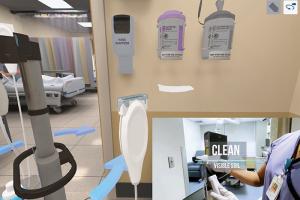Mercy Virtual expands its network of telemedicine partners

Nurses like Trina Cooper are available 24 hours a day to answer medical questions through the Mercy Nurse On Call program.
Mercy Virtual, St. Louis, has formed partnerships with two health systems to provide telemedicine services in each of their respective intensive care units (ICUs).
Mercy Virtual, part of Mercy health system, Chesterfield, Mo., recently signed a partnership agreement initially to monitor ICU patients at Penn State Milton S. Hershey Medical Center.
The partnership will expand over time across Penn State Health facilities and programs, drawing on both health systems’ expertise to create new care models.
“Virtual care will positively impact our quality, cost and the patient experience across our health system and beyond because it will allow us to identify and meet patients’ needs earlier,” says Craig Hillemeier, M.D., CEO, Penn State Hershey Medical Center and Health System.
“Having this ‘second set of eyes’ on our most ill and injured patients will identify and meet patients’ needs faster, often presenting simpler and less-intensive solutions,” he says.
Earlier in the year, Mercy Virtual signed a similar agreement with University of North Carolina Health Care to virtually monitor ICU patients at its hospital.
Initially, Mercy Virtual will monitor ICU patients in one of UNHC’s hospitals and then expand to include more services and programs.
The agreements mark a new phase in Mercy’s mission of establishing virtual health care with other health systems across the nation, while establishing a collaborative partnership with the health systems with which they work.
“By tapping into each other’s experience, we speed up the benefits to patients,” Moore says. “Mercy is building on more than a decade of innovations and learning so Penn State Health’s virtual journey to where we are today will be much faster. Together, our shared experiences will increase innovation while reducing costs and risks.”
The ultimate goal of the latest partnership is to create a health care consortium in which Penn State Health becomes a Mercy hub for providing virtual care services to other hospitals in the central Pennsylvania region.
Beyond increasing quality, access and efficiency for its patients, Penn State will leverage Mercy’s telemedicine experience to expand its own capabilities. LionNet, Penn State Health’s telemedicine program for stroke, added four community hospitals to its network in the past year for a total of 14 partner hospitals across central Pennsylvania.
In addition, Penn State dermatologists are conducting consults via telemedicine. A recently launched initiative allows physicians in the Milton S. Hershey Medical Center emergency department to connect with colleagues at Pennsylvania Psychiatric Institute in Harrisburg on patient consults that require specialty support.
In the past 10 years, Mercy has become a national leader in remote delivery of health care services, monitoring patients using high-speed data and video connections.
Last fall, Mercy opened its $54 million Virtual Care Center, a “hospital without beds” that operates 24 hours a day and is staffed by more than 300 clinicians.
Mercy’s virtual care began in 2006 with its TeleICU program in which doctors and nurses monitor patients by working virtually with bedside caregivers in 32 ICUs across seven states. The program has proven successful.
In the past year, ICUs that used Mercy’s TeleICU experienced a 35 to 40 percent reduction in patient hospital stays and 30 to 40 percent fewer deaths when compared with national benchmarks, according to Mercy. Other Mercy Virtual programs include Telestroke, virtual hospitalists, and an intensive ambulatory and care management program.
Projections for the future of telemedicine vary among research firms but all agree that it will grow rapidly, according to the American Telemedicine Association, Washington, D.C.
A report from Pharmaion Consultants LLC, New York City, titled “United States Telemedicine Market Opportunities, 2011–2021,” says the telemedicine market in the U.S. is projected to surpass $13 billion by 2021.




